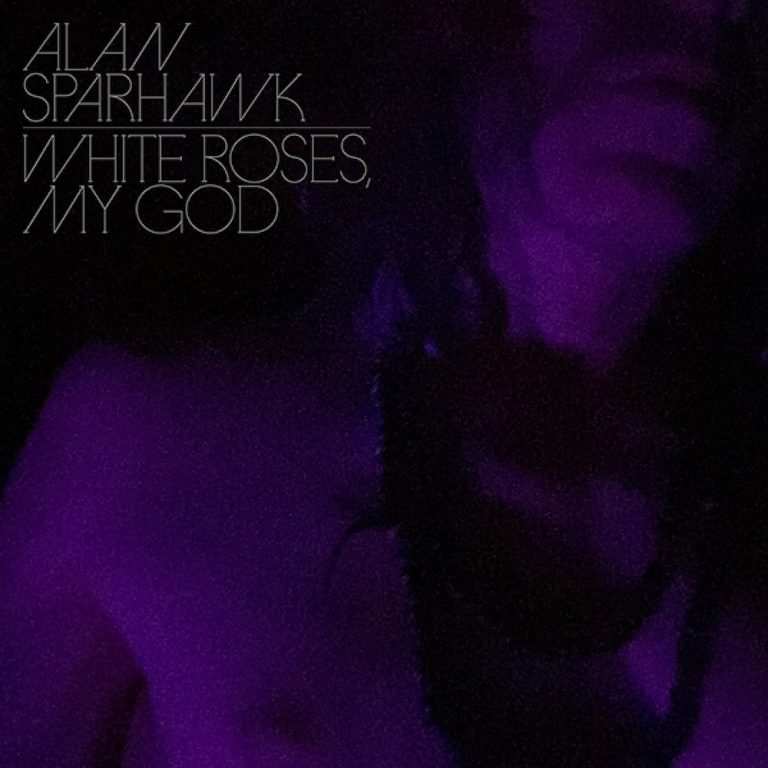With the 2022 death of his beloved spouse and collaborator, Mimi Parker, Alan Sparhawk dissolved the seminal band Low. His new solo album, while initially landing as a quirky departure from the duo’s elegant templates, is in many ways congruent with the band’s essential vision. Though White Roses, My God’s riffy electronics and manipulated vocals may at times seem gimmicky, they reiterate Low’s career-long fascination with the contrast between innocence and jadedness, child-like awe juxtaposed with a profound affinity for the biblical fall.
That is, Sparhawk and Parker were never fully sold on a nihilistic perspective. Even their last two albums, the dystopian Double Negative and icy Hey What, featured moments of distinct Romanticism, turbid gestalts offset by an appreciation for beauty and a belief in the possibility of redemption. Solo Sparhawk, too, refuses to sink into trendy meaninglessness. The world is indeed a broken place. Humans, however, play a large role in defining their realities. Possibilities abound, and birth is obviously as much a part of life as death.
Though heavily treated with various effects, Sparhawk’s vocals, over the course of the sequence, grow oddly evocative, their cartoonish tone normalized by hooky progressions and a series of galvanic riffs. “I Made This Beat”, for example, is built around an infectious pulse that wouldn’t be out of place on a Daft Punk album. Sparhawk’s melody is immediately catchy. There’s a guileless, happy-go-lucky vibe here; various segments and intonations, however, also exude a palpable fatigue. Amidst electronic emphases and embracing a decidedly technological context, Sparhawk remains humanistically inclined.
“Feel Something”, too, employs a dancey template, Sparhawk singing, “I want to feel something.” Numbness, dissociation, thwarted desire, etc. are referenced within mechanistic sonic parameters. This blend of the human and otherworldly was mined intermittently throughout much of the Low oeuvre. Here, however, Sparhawk tackles the balance more directly (and, some might say, more simplistically), human experience located in a digital environment. In this way, White Roses, My God functions much like a sci-fi novel that, despite a futuristic setting, revolves around archetypally human themes and conflicts.
Always adept at using volume dynamics, Sparhawk pivots between quiet and louder segments on “Can U Hear”, his riff and melody compelling throughout. The track could appeal to an ecstasy-fueled crowd swaying in a warehouse at 3am as much as middle schoolers wearing socks, lined up in some Midwestern gymnasium. “I want to be there with the people I love,” he moans on “Heaven”, which could almost be taken as a kid’s singalong. On “Get Still”, Sparhawk’s vocal is particularly effects-laden, the singer sounding like someone who keeps hitting the helium tank. We could be at a birthday party, waiting for the star de jour to blow out candles, or a pre-apocalyptic soiree, keeping our paranoid sights on the sky.
“I can please myself with the things I seek out”, Sparhawk declares on “Station”, though he doesn’t necessarily sound convinced or convincing. Ultimately, the song is about distraction, how we use myriad activities to alleviate sorrow, boredom, anxiety, striving for connection and a sense of embodiment when so many of our coping skills; i.e., the constant craving for stimuli, actually disengage us from ourselves and others. The soundscape is austere yet slightly foreboding as synths swell and shrink. Around the two-minute mark, vocal parts blend and contrast with each other, creating subtle harmonies and frictions. “Somebody Else’s Room” is the album’s most innovatively catchy tune, a track that, in a fair universe, would be included on any number of playlists and considered for end-of-the-year best-song groupings.
With White Roses, My God, Sparhawk crafts a set that diverges from Low’s aesthetic – veering in a more pop direction while plumbing the intersection of entertainment and art – though there are tonal, lyrical, and energetic overlaps. Sparhawk is still fascinated with the tension between exile and salvation, transgression and redemption, the hellish and the paradisal. White Roses, My God spotlights an adventurous artist who wrestles with philosophic and existential concerns, often conjuring a collaboration between Philip K. Dick and Dr. Seuss. Working with whimsicality as much as grief, Sparhawk reinvents himself, exploring inner landscapes and imaginary worlds, all while having a bit of fun.

